
Best Formula For Preemies: If you were blessed with a preemie baby, you have to consider yourself very lucky. These babies need extra care and a lot more attention from the moment they are born. Because their bodies are not fully developed, there could be different health challenges they have to face. However, many of these challenges can be prevented by giving them the right type of nutrition and care.
All the formulas for preemies that you will find in this guide are reliable and safe. But the best one has to be the Gerber Good Start with probiotics.
Jump to:
- Is formula OK for preemies?
- What are the things that a preemie lacks nutrition-wise?
- When to go for the formula for preemies?
- Should formula be supplemental along with breastfeeding?
- How much formula should a preemie drink?
- Are preemies prone to reflux or sensitive stomach issue?
- Preemie Formula feeding Chart
- What to look for in formula for preemies?
- Best Formula for Preemies
- Key References
This guide will tell you everything you need to know about the best formula for preemies. You will discover useful information that will lead you towards the best choice for your little one!
Is formula OK for preemies?
One of the first questions that come to mind as a mother of a premature baby is if you can feed them formula instead of breastmilk. As any pediatrician will tell you, breastmilk is the ideal type of food for newborns, especially if they are preemies. But if for any reason you can't breastfeed, you will have no other option but to give your baby formula.
You can also supplement breastfeeding meals with formula meals if your milk flow is not constant. So, as long as you choose the right formula for your baby's needs, there is no problem!
![]()
What are the things that a preemie lacks nutrition-wise?

Premature babies are not entirely developed in any form. However, the deficits they have in terms of nutrition will differ according to which month of the pregnancy they were born at. Babies born at six months of pregnancy are more deficient in terms of nutrition than those born closer to their full term.
But the type of nutrients they lack remains the same regardless of the term they were born at. Only the level of these deficits might modify
- Calcium: Calcium is one of the main things preemies lack. Because they are born before term, they didn't get to develop to the standards that are suitable for the world outside the womb. Therefore, their bones, in particular and later their teeth, will need support. While your baby is in the Neonatal Intensive Care Unit (NICU) section, they will receive supplements of Calcium to balance their body's needs.
- Fat: These babies are usually very fragile. If you expect to see a chubby, fluffy preemie, that will most likely never happen. The early preemies (born before 32 weeks of pregnancy) are very skinny, and they lack a layer of fat that they would usually achieve in the last month of pregnancy. This fat layer keeps babies safe of infections, it keeps their skin as well as their hair healthy and gives them energy. It also feeds their brain. So, it is essential. Luckily, with proper care and nutrition, preemies will catch up and turn out to be similar to regular babies in a few months!
- Folate: Folate is an essential nutrient to help the cells in your baby's body. This is why, as a pregnant mother to be, you most likely took folate supplements to support your baby's development inside the womb. If your baby is born early, they will not benefit from these supplements anymore, so they should receive them from an external source. A folate deficit can be fixed through proper feeding, as well as certain supplements recommended for preemies.
- Iron: Iron is essential for your baby's blood cells as well as their brain development. They receive the iron they need in the womb, as long as the mother has a balanced diet. But as preemies, their iron supply ends unexpectedly. The NICU medical staff will most likely give your baby iron to establish their balance. But you should also continue this course by feeding them a formula high in iron. If you breastfeed your baby, add an iron supplement to be sure they overcome their deficit.
![]()
When to go for the formula for preemies?
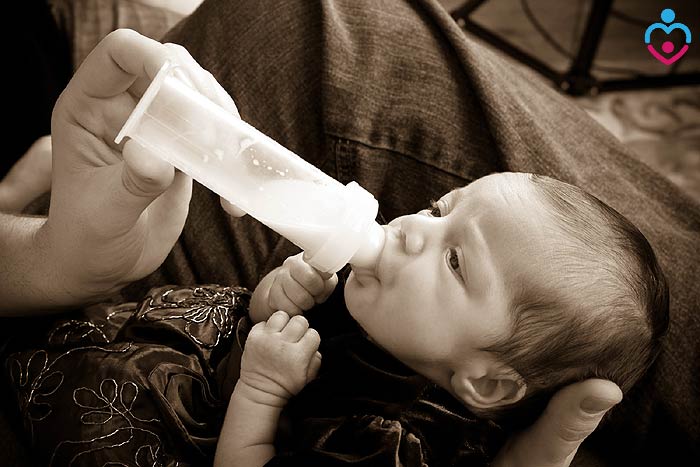
Even if breastmilk is the best type of meal for a preemie, sometimes you might need to switch to formula. The following situations ask for replacing or supplementing breastmilk with formula.
- If you have a specific medical condition and you are not supposed to breastfeed, to begin with. Mothers who take strong medication like blood thinners, for instance, might not be allowed to breastfeed as these medications pass through the breastmilk and can harm the baby. Your doctor will advise you according to your specific situation.
- When your breastmilk is lacking certain nutrients. You might think that if you have a calcium deficit, for instance, all you need to do is take a supplement, and your breastmilk will be up to the expected standards. But this is not the case. Mothers who have severe deficits of nutrients in their organism or are anemic will most likely need to supplement baby's meals with the proper formula. You might even want to replace breastfeeding with formula altogether. But get a set of analysis done before you decide this because you need to know how balanced your body is.
- If your baby has a serious lack of certain nutrients. As we mentioned before, babies might have a deficit of nutrients as they are not fully developed when they are born before term. Your doctor will give you a set of analysis for your little one before you leave the hospital. They will also recommend the type of formula you need to look for to overcome those deficits. For instance, if your baby has a significant iron deficit, you will need to find a formula that is rich in iron.
![]()
Should formula be supplemental along with breastfeeding?
If you can breastfeed your preemie, you definitely should do that. However, if your breastmilk is not as rich in nutrients or you have a form of anemia, you can supplement it with formula. Your doctor will give you specific advice considering your condition, so your baby gets the best nutrition as weeks go by.
Supplementing your baby's breastfeeding meals with formula has a variety of benefits for both of you:
- By choosing the right formula, you make sure that your preemie gets all the nutrients they need to grow harmoniously. You can't be too safe when it comes to preemies, so giving them formula along with your breastmilk can only work in their benefit.
- You save time on breastfeeding. If you are a busy mother or you started going back to work, breastfeeding is not something so easy anymore. It takes time, and you need a certain level of privacy to do it. Using formula can save you time and help you relax more. It is also an excellent alternative for mothers of multiple babies who struggle with breastfeeding.
- You can choose just the type of formula your baby needs. If your preemie has a specific deficiency, supplementing your milk with a formula that is rich in that nutrient is an excellent alternative to other supplements. You can simply alternate breastmilk meals with formula meals so you can cover all the needs your baby has.
![]()
How much formula should a preemie drink?
The amount of formula that your baby should drink depends on the age they have. Take into account that preemies will have specific needs as well. Some get hungry more often than others, as each baby is different. So, the following quantities are not set in stone for all preemies, but they are great guidance!
- In the first month, your baby will eat about 15 ounces of formula in a day if they have a birth weight of 4 pounds or more. Babies that weigh less than 4 pounds might eat around 12 ounces of milk in a day.
- After the first month of life, the quantity of formula or milk they drink will increase gradually. You will notice if they are not full after a meal because they will get fussy or cry when the bottle is empty. If this happens, you should supplement the portion and notice how much they drink until they are satisfied.
- This pattern should continue until 6 months of age. After this time frame, you should start introducing solid food slowly each day until your baby doesn't rely on formula for their meals anymore. This transition from formula to solid food is similar to the way you would implement it for a full-term baby.
![]()
Are preemies prone to reflux or sensitive stomach issue?
Preemies are prone to all kinds of health conditions, but that doesn't mean they will develop complications. When it comes to reflux and other stomach issues, the risk for preemies to develop these conditions is higher than for full-term babies.
Because preemies are not fully developed, acid reflux is a common affection for them. The muscle that should close their stomach after they swallow will be more flexible, and therefore, you will have to be prepared for reflux episodes. Sometimes acid reflux might mean spit ups after eating while other times it just means increased burping.
Your baby might get out of the reflux issues in just a few weeks with no special treatment. They just need some time to allow their bodies to catch up on the development scale. But there are also situations when this condition needs further treatment. Either way, your baby should get out of the acid reflux condition by the time they turn one year old.
A severe condition of acid reflux is the GERD disease (gastroesophageal reflux disease). In this case, the doctor will prescribe you the right treatment for your preemie, and you should respect that strictly. Feeding them a formula that reduces reflux will also help.
Suggested Readings:
![]()
Preemie Formula feeding Chart
Feeding your preemie doesn't come with a set-in-stone schedule. Or at least not one that will remain the same for too long. Here is a general chart that should help you guide yourself when you establish a schedule for your baby's meals.
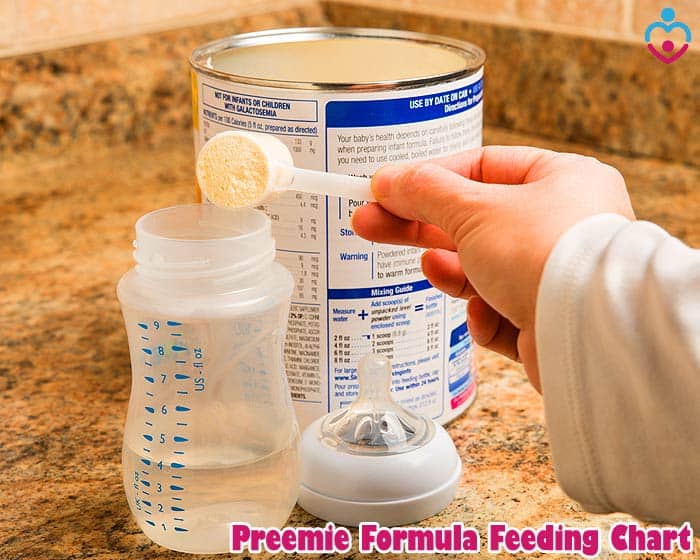
| First month | Every 2 to 3 hours | Around 1.5 or 2 ounces |
| One 1 to 3 months | Every 4 hours | Between 2 and 3 ounces |
| 3 to 4 months | 5 meals a day (6 meals if they wake up during the night) | 4 ounces or more |
| After 6 months | A bottle in the morning and one in the evening with solid food during the day | 6 ounces or more |
You can also consider the following tips when you establish the feeding schedule for your baby.
- Some babies will eat more or less than these quantities. Learn to pay attention to your baby's preferences and adjust the feeding schedule accordingly. It is no tragedy if they don't finish the bottle every now and then as long as they are eating every meal at least half of the initial quantity.
- It is also safe to feed your baby on demand in the first months of life. If they cry for food in between meals, give them half of the formula quantity they would eat in a regular meal. These snacks help them grow and adjust their bodies to a schedule they are comfortable with.
- A first thumb rule is that your baby should eat, on average, about 2.5 ounces of formula for 1 pound of their weight. However, try not to stick to this rule religiously as each baby will develop their own eating preferences.
- Most likely, when your baby comes home from the NICU section, the medical stuff will already tell you a preferred schedule. Preemies might be fed through IVs for the first days of life, depending on how early they were born and how well developed they are. But they will not be released from the hospital until they have a feeding schedule, and they tolerate the bottle well enough. Try to stick to the initial schedule but adjust it as your baby grows older, and they need more food.
![]()
What to look for in formula for preemies?
If you want to end up with the best formula for your preemie, you need to take into account the following aspects:
- Ingredients in the formula: It is vital to invest in the baby formula that comes with as many natural or organic ingredients as possible. You want to stay away from harmful chemicals as well as artificial flavorings. You can also find hypoallergenic formulas if you want to make sure that your baby will not have to deal with any side effects.
- What are the expected effects of the formula? The market offers preemie formulas that will reduce gas or colic but also some that will get rid of the fussiness and help the baby sleep better. You should go for the formula that offers the best solution for the problems your little one has. Also, invest in a formula that is rich in a nutrient your baby is lacking. For instance, some preemies have an iron deficit. In this case, the formula should supplement the iron needed daily.
- Baby age the formula is recommended for: It is essential to feed your baby an age-appropriate formula. Start with a formula that is recommended from zero to six or 12 months and switch to a different stage formula as your baby grows. Different formulas are meant for different ages because they have a specific concentration of vitamins and nutrients.
![]()
Best Formula for Preemies
The following formulas are ideal for preemies. They cover all kinds of nutritional deficits and can help your baby grow stronger over time!
1. Similac Alimentum Hypoallergenic Infant Formula
Similac is one of the best brands for preemies' formula that you will find on the market. They offer formulas for all types of preferences and needs!
- This is a hypoallergenic formula that is perfect for preemies. Preemies are a lot more sensitive than full-term babies, and hypoallergenic formulas are ideal for them.
- It is recommended for babies with colic episodes as well. Because it is easy to digest this formula, your little one will be more relaxed after they drink it too.
- If your preemie is sensitive to protein or certain types of protein, this formula will not bother them at all. It is created especially for babies with such sensitivities.
- This formula will be an excellent solution for babies allergic to cow milk. It has a predigested protein that comes into tinier pieces to accommodate your baby's needs.
- As for the difference between this formula and breastmilk, you should know that it follows the same structure. The Similac formula contains DHA as well as ARA, which are nutrients that are found in breastmilk too. They support both brain development and eye development.
- Hypoallergenic formula
- Adequate for preemies that are protein sensitive.
- Contains DHA and ARA nutrients.
- Perfect from the first day of life.
- Reduces colic episodes
- Sweeter than other formulas.
- Might not be enough for babies that are not protein sensitive.
![]()
2. Enfamil A.R. Ready to Feed Spit Up Baby Formula Milk
Enfamil is another trendy brand when it comes to formulas for preemies. This particular type of formula will help your little one tremendously.
- This formula comes in ready to feed bottles. You will not have to worry about mixing it with water or diluting it with anything. It is prepared for your baby to enjoy every time they need to eat. Inside the box, you will find 48 bottles of 2 oz each.
- Many preemies suffer from spit up episodes, but this formula is made especially to help them overcome this condition. It will reduce spit-up by 50 % in the first week of using this formula.
- The American Academy of Pediatrics recommends this formula for babies who have frequent acid reflux. So, you can rely on its positive effects on this aspect.
- You can feed this formula to your preemie since the day they are born until 1 year old. But keep in mind to add solid foods in their diet, starting with six months.
- This formula contains over 30 different nutrients. It has 3 DHA as well as Choline to make sure your baby's brain and eyes develop correctly. It also contains vitamin C, E, and Selenium. These are essential nutrients for the immune system too.
- Ready to feed formula.
- Rich in all the nutrients your baby needs.
- Reduces acid reflux and spit ups.
- Recommended by pediatricians
- No mixing needed
- Contains sweeteners that might give your baby more energy than needed.
![]()
3. Gerber Good Start Soothe Non-GMO Infant Formula
If you are looking for a preemie formula, Gerber Good Start is ideal for your little one. It is rich in nutrients, and you can find it easily in all stores as well as online.
- This formula is created to follow the structure of your breastmilk. It offers all the nutrition your baby needs to have a good start in life indeed.
- It will reduce crying, colic, fussiness, and irritability in newborns. Preemies, in particular, might be fussier than other babies, so this is an excellent benefit of this formula.
- It is adequate for babies up to 12 months old and offers them complete nutrition to overcome all their deficits.
- This formula contains essential probiotics and prebiotics but is also rich in protein. It has 30 % less lactose, so your baby will have less gas as well.
- It is the type of formula that comes from whole fruits and veggies extracts, so your baby gets as many natural vitamins and nutrients as possible.
- Rich in all the nutrients your preemie needs.
- Recommended for babies up to 12 months old.
- Reduces fussiness, colic, and gas.
- Contains 30% less lactose.
- Made of mostly natural ingredients.
- It is not hypoallergenic, so if your baby has a protein sensitivity you should talk to your doctor.
- Might cause loose stools.
![]()
4. Baby Colic Calm Baby Magic Tea
A different type of product that you can give to your preemie is this tea from Secrets of Tea.
- Preemies often suffer from colic, gas, and acid reflux. This tea will help them with all these unpleasant conditions so they can be calmer and rest better.
- One of the most essential advantages of this tea is that it helps babies sleep better. They will not wake up crying in the middle of the night, so you can both rest.
- You should give your baby three to four portions of this tea a day. Each portion should have one, two, three, or up to five ounces according to your baby's age.
- It is a medicinal, natural tea that will not have any side effects on your baby. But keep in mind that it doesn't replace the daily meals your baby needs.
- It is an FDA approved product made of the highest quality ingredients. It is also a vegan and organic product, which makes it even more reliable.
- These tea bags are biodegradable and sanitized, so your baby is completely safe while drinking this tea.
- You can give this tea to your baby since the day they are born. There are no safety risks with this product, and you can adjust the dose to see the results you want.
- Reduces colic and digestive issues in preemies.
- FDA approved
- Vegan and organic product.
- Perfect from the first day.
- No chemicals or artificial flavorings.
- It doesn't replace your baby's meals.
- Is not sweet and some babies might not like it.
![]()
5. Kabrita Goat Milk Toddler Formula
This formula is another great choice for offering your preemie the best nutrients to help them recover from premature birth.
- It is easier to digest for preemies than another formula.
- This formula is based on non-GMO goat milk, which is the best alternative to cow milk. So, if your baby has a sensitivity to the traditional cow milk, this formula is a great choice.
- Keep in mind that this is a good option for babies that are sensitive to cow milk, not allergic to cow milk protein.
- It has a naturally sweet taste that most babies like, and you will not have to convince your preemie to drink it. Smells and tastes similar to regular goat milk.
- This formula contains more than 22 vitamins to support your preemie's development. It is rich in iron, DHA and ARA nutrients as well as folic acid.
- It doesn't contain any hormones, antibiotics, or harmful chemicals, so you can rely on it for your baby's daily nutrition.
- Rich in 22 vitamins.
- Adequate for preemies that are sensitive to cow milk.
- Sweet taste
- No chemicals added
- Easy to digest
- Not recommended for babies that are allergic to cow milk protein.
- Might be more difficult to find on the market than other formulas.
![]()
6. Similac For Spit-Up NON-GMO Infant Formula with Iron
Another Similar formula that you can't fail with is this one, which will reduce spit-up episodes too.
- Just like other Similac baby formulas, this one contains no harmful chemicals or artificial flavorings. You can count on it to give your baby all their daily meals.
- It contains rice starch and will reduce spit-up episodes significantly in the first week once you start giving it to your preemie.
- Keep in mind that this formula is not recommended for preemies that suffer from galactosemia.
- It contains DHA, Vitamin E, Lutein as well as other vitamins and minerals that will support your baby's growth.
- This formula has a similar nutritional structure with breastmilk, but it contains even more vitamins.
- Contains all the nutrients your baby needs.
- Adequate from the day your baby is born.
- No harmful chemicals
- Rich in DHA, Lutein and vitamin E.
- Supports brain and eyes development as well as the immune system.
- Not recommended for babies with galactosemia.
- Might be thicker than other formulas due to the rice starch ingredient.
![]()
7. Enfamil Premium Newborn Infant Formula
Enfamil also offers this formula that is specially created for the needs your preemie has in their first months of life.
- It is recommended for babies in the first three months of life.
- Inside the package, you will find 48 bottles that are ready to use. You will not have to mix this formula with water or anything else.
- It is rich in iron and based on non-GMO milk, so you don't have to worry about any side effects.
- This formula also comes with a high concentration of DHA, two types of prebiotics as well as over 30 different nutrients for your preemie.
- It supports the brain, eyes, and immune system development while it has a pleasant and sweet taste.
- Pediatricians also recommend this formula as it is very nutritious for preemies.
- Rich in over 30 nutrients.
- Contains DHA and prebiotics.
- Recommended for preemies from zero to three months.
- Supports immune system, eyes, and brain development.
- Supported by pediatricians
- The nipples for the bottles are not included in the package, but most likely you will have a few handy already.
![]()
8. Nutricia Neocate LCP
This Nutricia formula is also an excellent choice for preemies that need to get active and healthy through proper nutrition.
- It is perfect for the first year of life, so you will not have to switch from this formula to another.
- This formula is based on amino acids. Amino acids are essential for brain cell development, so they are crucial for your baby from the time they are born.
- Besides amino acids, this formula contains all the vitamins and minerals a preemie should have to grow healthy.
- It is hypoallergenic as well, so you don't have to worry about side effects. Thanks to this, the Nutricia formula is adequate, even for sensitive babies.
- You receive a container of 400 grams of formula, and you can always order more of it once you see that your baby likes it.
- Hypoallergenic formula
- Based on amino acids.
- Contains all the essential nutrients.
- For babies up to 12 months.
- Perfect for all types of babies.
- You might not be able to find it easily in stores or even online.
- Not so efficient in reducing reflux and colic.
![]()
9. Gerber Good Start Gentle Non-GMO Infant Formula
Gerber has this formula that will accommodate your preemie's needs in the first months of their life.
- First of all, this is the best formula if you are looking for one that will resemble breastmilk. It offers your preemie all the nutrients they need daily.
- It reduces colic, gas, fussiness, and crying in babies up to 12 months old.
- This formula is rich in probiotics, prebiotics, DHA, and other vitamins and minerals.
- You can use this formula when you introduce solid foods in your baby's diet too. It goes great with different grains and cereal.
- Your little preemie shouldn't have any problems digesting this formula even from the first day of their life.
- All the ingredients are of exceptionally high quality, so you don't expose your baby to any type of risk by feeding them this formula daily.
- Very similar to breastmilk.
- Contains probiotics, DHA, prebiotics and other vitamins.
- Goes great with cereal.
- Reduces gas, colic, and fussiness.
- Comforting for preemies
- Might have a different smell than other formulas but it is not going to bother your preemie at all.
![]()
10. Nestlé Lactogen 1 Infant Formula Powder
The last but not least formula that is very appropriate for preemies is this Nestle one.
- It is a formula created especially for infants in the first six months of their life. Your preemie will find all the nutrients they need in every meal with this formula.
- It contains no harmful chemicals, no artificial flavorings, or preservatives.
- This formula is created to replace breastmilk entirely as it has everything your baby needs to develop healthily.
- It is enriched with 33% more whey protein. These proteins are a lot easier to digest, which makes them ideal for preemies' formulas.
- Once your baby reaches 6 months of age, you can go forward to Lactogen two until they get to one year old. There is also a Lactogen 3 for babies older than 12 months.
- Perfect for all types of preemies.
- No harmful chemicals or flavorings.
- 33% more whey protein.
- Easier to digest
- Replaces breastmilk successfully
- Not recommended for babies older than six months.
- Might have a strong taste that not all babies will like.
![]()
As we mentioned at the beginning of this complex guide, the Gerber Good Start formula is the best to feed your preemie baby.
- This formula is recommended for babies born after 32 weeks of gestation as well as very early preemies that are born before 32 weeks of pregnancy.
- It supports your baby's immune system every day so they will grow into a healthy toddler before you know it.
- This formula is ideal for brain and eye development as well, which is very important for preemies.
- You can find it easily in all stores and online websites, so you don't have to worry about this aspect.
- It is also adequate for babies from 0 months to 12 months of age, so you don't have to switch to another formula for an entire year!
The type of formula you choose for your preemie is essential for their development and overall health. Once you know the needs your baby has in terms of nutritional deficiencies, you can invest in the right formula for them.
![]()
Key References
- "Premature birth - Symptoms and causes - Mayo Clinic". Accessed February 23, 2020. Link.
- "Feeding Premature Babies | Premature Baby Formula | Patient". Accessed February 23, 2020. Link.
- "Supplementing With Formula - Breastfeeding Support". Accessed February 23, 2020. Link.
- "Reflux in Preemies: Symptoms and Treatment". Accessed February 23, 2020. Link.





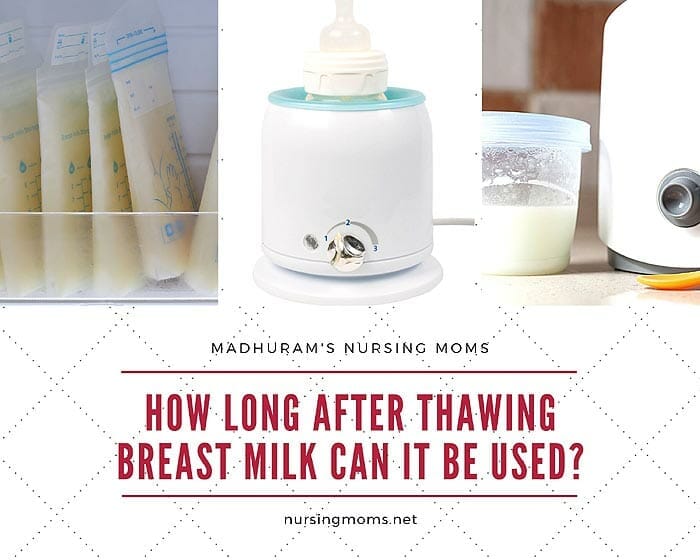
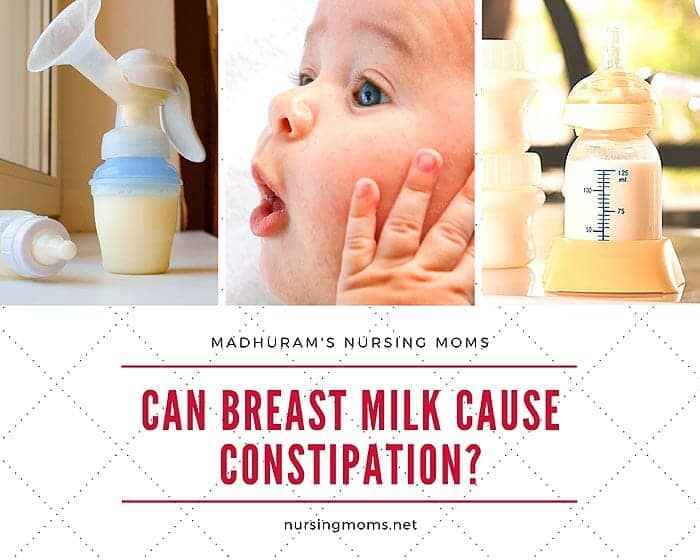


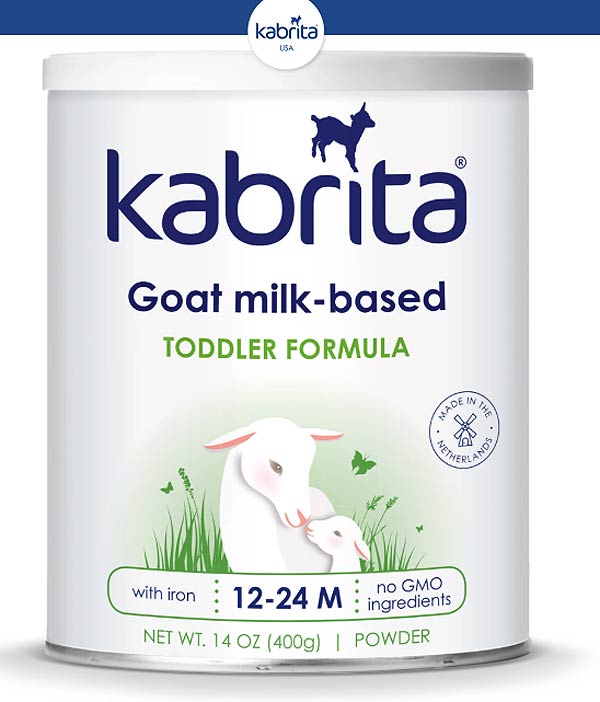
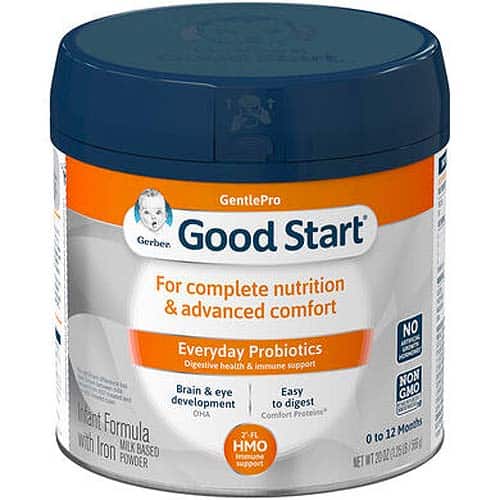
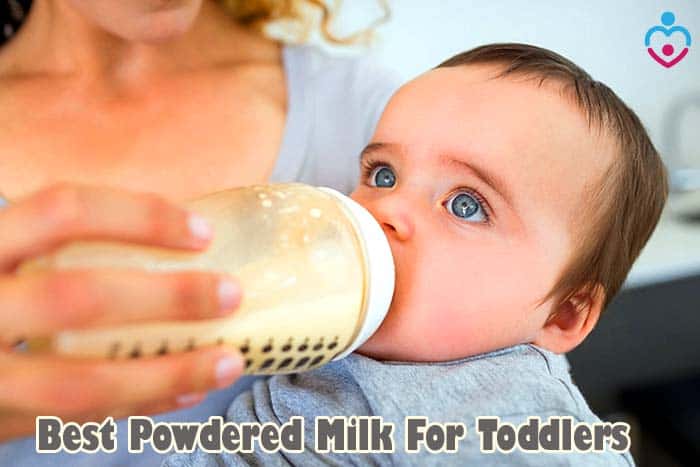

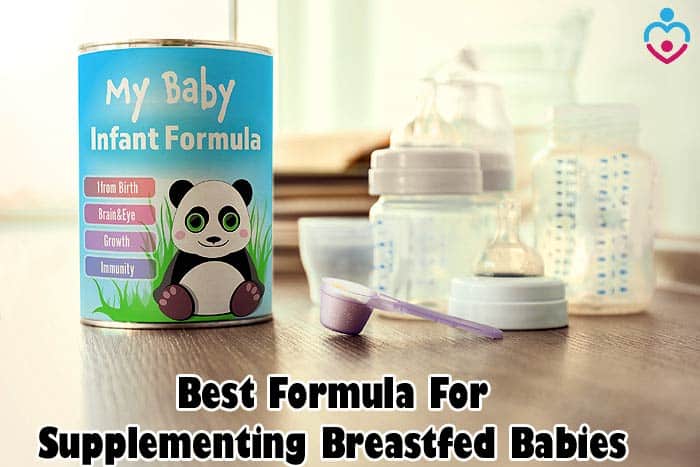
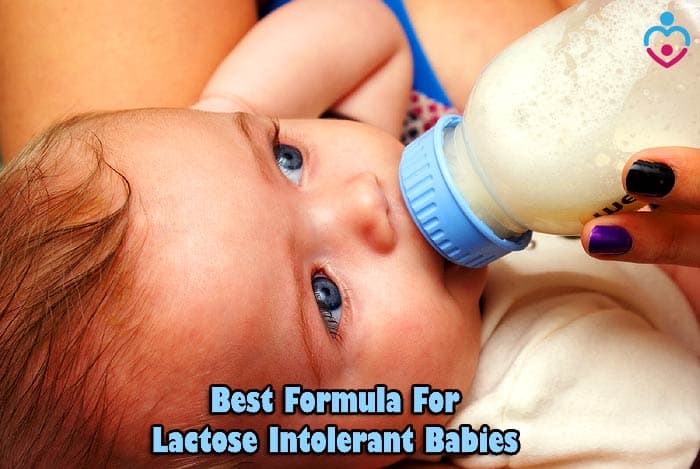
Leave a Reply